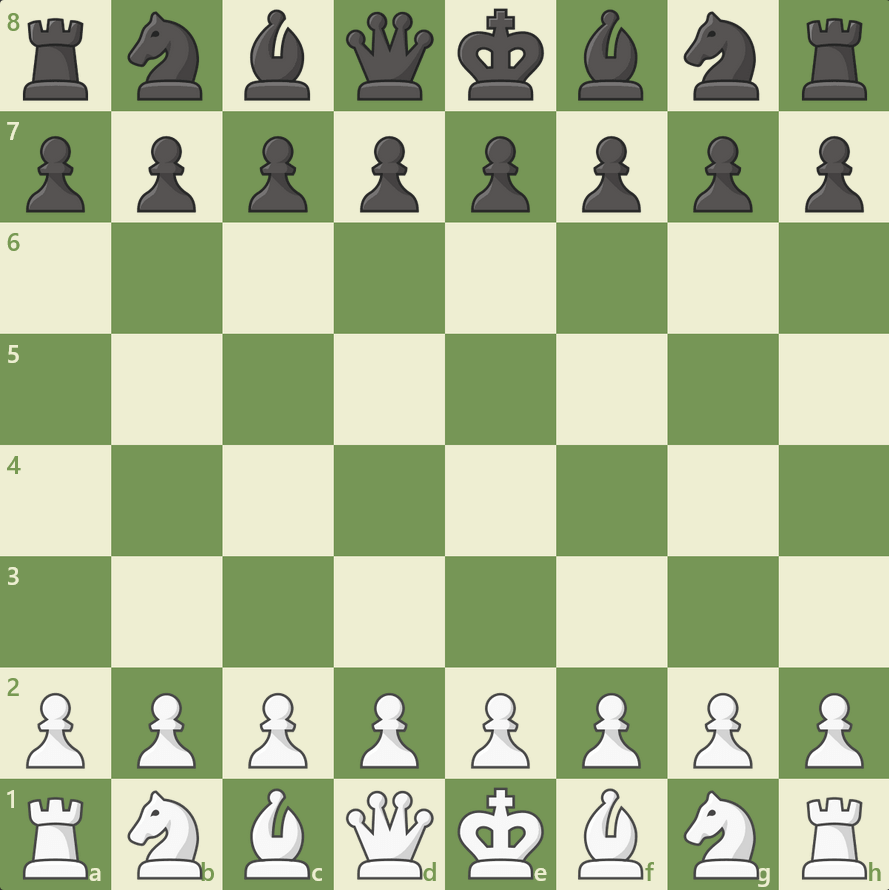Everything about Chess: Discover the Fascinating History and Approaches Behind the Game
Chess, with its beginnings going back to 6th century India, has transformed significantly over the centuries. This game has captivated minds worldwide, showcasing the radiance of epic gamers like Garry Kasparov and Bobby Fischer. Recognizing the intricacies of chess, from the movements of each item to essential strategies, discloses its deepness. Yet, the question continues to be: what drives the sustaining attraction with this ancient game? Discovering its background and methods may reveal much deeper insights.
The Origins of Chess: A Trip With Time
Although the precise beginnings of chess continue to be unpredictable, historic evidence recommends that the game progressed from earlier strategies played in India around the 6th century. Referred to as Chaturanga, this very early kind of chess featured items representing infantry, mounties, elephants, and chariots, showing the armed forces tactics of the time. As Chaturanga spread out with profession paths, it adapted to different societies, leading to the creation of Shatranj in Persia. This alternative presented new policies and piece motions, laying the structure for contemporary chess.
Chess Prodigies: Remarkable Figures in the Game's History
Throughout chess background, amazing prodigies have actually emerged, shaping the game's landscape and inspiring future generations. From legendary champs that dominated the boards in their time to modern talents redefining the limitations of young people and ability, these players have made enduring marks on the sporting activity. Their stories highlight not only individual luster however also the evolving nature of chess as an affordable endeavor.
Fabulous Chess Champions
Chess has actually been formed by the luster of many fabulous champs whose contributions have left an enduring mark on the game. Numbers like Garry Kasparov, understood for his dynamic design and unequaled critical deepness, controlled the chess world during the late 20th century. Anatoly Karpov, his competitor, showcased phenomenal positional understanding and psychological expertise, safeguarding numerous globe titles. Bobby Fischer, an American natural born player, changed chess with his unrivaled talent and intense focus, finishing in his 1972 Globe Champion success. In Addition, José Raúl Capablanca's natural capability and endgame mastery set brand-new standards in the very early 20th century. These champs not only mastered competition but likewise influenced generations, forming chess into a worldwide sensation commemorated for its intellectual rigor and creativity.
Contemporary Prodigies
What makes a chess natural born player genuinely exceptional? The ability to comprehend complicated strategies at an amazingly young age establishes them apart. Modern chess natural born players like Magnus Carlsen, Fabiano Caruana, and Alireza Firouzja have actually astounded audiences with their extraordinary ability. Carlsen, ending up being a Grandmaster at simply 13, redefined expectations and ascended to Globe Champion standing. Caruana, recognized for his deep prep work and tactical expertise, has actually regularly challenged the elite. Firouzja, born in 2003, represents the new generation, integrating imagination with ruthless ambition. These gamers exhibit a mix of inherent ability, strenuous training, and mental perseverance, influencing the game's advancement. Their payments guarantee that chess continues to be a vibrant and lively discipline, inspiring future generations of gamers worldwide.
Comprehending the Chessboard: Pieces and Their Motions
The chessboard works as the field of battle where complex approaches unfold, including an one-of-a-kind collection of items, each with unique motions and duties. Consisting of 64 squares prepared in an 8x8 grid, it is home to the king, queen, rooks, knights, diocesans, and pawns. The king, one of the most vital item, relocates one square in any kind of direction, while the queen, the most effective, can traverse any type of variety of squares up and down, horizontally, or diagonally. Rooks move in straight lines, whereas diocesans move diagonally across the board. Knights possess a special L-shaped movement, leaping over various other pieces. Pawns advance one square but capture diagonally, with the option to move two squares ahead on their first action. Each item's motion adds to the elaborate dancing of technique and methods, making the chessboard a dynamic phase for intellectual battle. Understanding these movements is basic for gamers home aiming to browse the complexities of the game.

Essential Strategies for Beginners: Tips to Enhance Your Game
Understanding the activities of chess items lays the groundwork for establishing effective approaches. For newbies, concentrating on regulating the facility of the board is vital. This enables better movement and influence over the game. Developing items early, instead of moving the same item numerous times, can assist establish a solid position.
Furthermore, players ought to prioritize king safety and security by castling early, making certain the king is concealed from hazards. Identifying tactical opportunities, such as forks, pins, and skewers, can supply benefits in product gain. It is likewise vital to believe in advance; preparing for a challenger's relocations promotes far better defensive and offensive play.
Preserving a well balanced technique in between hostile and protective approaches can stop unneeded blunders. By executing these essential strategies, beginners can improve their gameplay and construct a solid structure for future enhancement in chess.
Advanced Strategies: Boosting Your Chess Abilities
In the domain of chess, grasping advanced strategies can significantly improve a gamer's resource capacity. Recognizing tactical patterns, grasping endgame methods, and comprehending opening up principles are important aspects that raise one's game. These elements not only enhance general performance but also foster deeper tactical reasoning.

Tactical Patterns Recognition
Acknowledging tactical patterns is essential for elevating chess skills to a higher level. Players who master these patterns can determine chances for tactical maneuvers, improving their opportunities of success. Usual patterns consist of forks, pins, skewers, and uncovered strikes, each offering strategic advantages when performed efficiently. Recognizing these concepts permits gamers to expect their challenger's relocations and counter them effectively. Additionally, studying go to these guys classic games can disclose just how masters utilized tactical patterns to secure victories. Routine practice and evaluation of one's very own games can even more reinforce pattern recognition, allowing players to react promptly and properly throughout suits. Ultimately, honing this skill transforms the technique to chess, linking the space in between amateur and advanced play.
Endgame Methods Proficiency
Effective endgame strategies can greatly influence the end result of a chess match, commonly determining the difference in between a win and a draw. Advanced gamers recognize the importance of item coordination and the utilization of pawns in the endgame. Key techniques include advertising pawns to queens and creating passed pawns that can progress unobstructed. Identifying vital placements, such as the resistance and zugzwang, is vital for attaining beneficial configurations. Proficiency of endgame strategies, such as king and pawn versus king scenarios, can turn possible losses right into attracts or wins. Players must additionally concentrate on simplifying the placement when in advance, exchanging pieces to convert material advantages into victory. Continual practice and analysis of endgame positions will elevate a player's general chess skills greatly.
Opening Principles Comprehending
Understanding endgame strategies lays a strong structure for comprehending opening principles. In chess, the opening stage is essential as it establishes the phase for the middle game. Chess. Players ought to focus on control of the center, creating pieces effectively, and ensuring king security. Efficient openings often include moving pawns to establish main prominence while working with minor and major items for top activity. The principles emphasize not relocating the same item numerous times without necessity and avoiding early queen development, which can lead to susceptability. By sticking to these foundational strategies, gamers can develop a solid framework that boosts their tactical chances later in the game. Comprehending these opening up principles is crucial for elevating one's chess skills and accomplishing success

The Cultural Impact of Chess: Why It Matters Today
Chess, a video game with origins mapping back over a millennium, proceeds to put in a profound social impact throughout the globe. It transcends mere home entertainment, functioning as a tool for education, important reasoning, and social communication. Several educational institutions integrate chess into their curricula, promoting cognitive development and tactical reasoning among trainees. The game also promotes inclusivity, bringing with each other diverse neighborhoods and motivating intergenerational links.
Chess has actually penetrated popular society, motivating literary works, movies, and even fashion. Legendary numbers like Bobby Fischer and Garry Kasparov have actually ended up being cultural icons, highlighting the game's potential for personal and nationwide satisfaction. In the digital age, on-line platforms have further equalized access to chess, making it possible for millions to involve with the game. As society faces intricate difficulties, chess remains appropriate, supplying lessons in patience, foresight, and strength, thereby strengthening its value in modern culture and life.
Frequently Asked Concerns
Just How Has Chess Influenced Pop Culture and Media?
Chess has actually significantly influenced preferred culture and media, showing up in films, literary works, and art. It symbolizes intellect and technique, inspiring stories and characters while advertising styles of dispute, competitors, and the human experience.
What Are the Benefits of Playing Chess for Mental Health And Wellness?

Exist Different Chess Variants Played Around the World?
Yes, different chess variations are played around the world, consisting of Bughouse, Chess960, and Three-check chess. Each alternative presents one-of-a-kind rules and strategies, offering players with diverse experiences and difficulties that differ from standard chess.
Just How Do Chess Engines and AI Influence Modern Chess?
Chess engines and AI substantially improve modern chess by supplying innovative analysis, enhancing player skills, and influencing techniques. They act as training tools and competitors help, transforming how players approach the game in all degrees.
What Are Typical Misconceptions About Chess Athletes?
Typical false impressions concerning chess players include the idea that they are all withdrawn wizards, solely concentrated on strategy. Chess. Actually, gamers differ substantially in individuality, history, and method, typically delighting in social communications and diverse interests